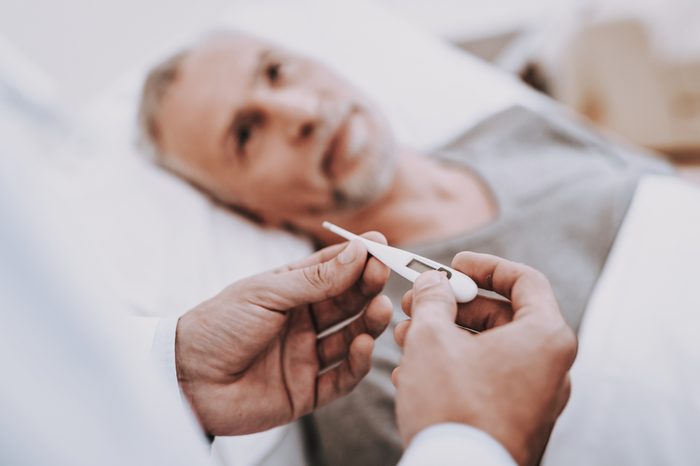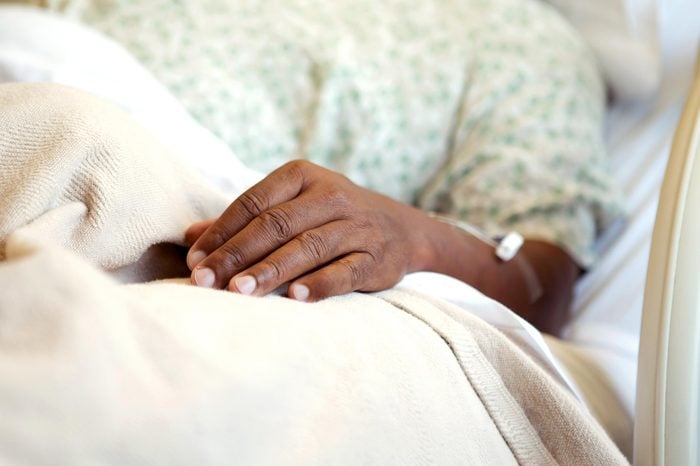How to speed up your hospital discharge
Once you’re ready to leave the hospital, there are a few things you can do to speed up the discharge process—but you should actually start preparing before you plan on leaving. In fact, there are a few things you can do to make the process quicker and smoother from the minute you arrive. Here’s what you need to know.

Ask about it today
We often wait to talk about discharge until the day of. “The time to have that conversation is on day one,” says Suparna Dutta, MD, chief of the division of hospital medicine at Rush University Medical Center. Getting out early can help you control costs, and you can start thinking about arranging transportation home and take any necessary steps needed to prep your home in case you have any post-surgical limitations.

Keep moving
“Being in the hospital can get debilitating quickly. Laying in bed isn’t good for anyone,” says Dr. Dutta. Your lungs don’t expand and you’re more prone to infections, she adds. When your doctor tells you it’s time to get moving, make an effort to walk the halls or simply get up to sit in the chair in your room. This will help keep you strong and in shape no matter your age or reason for being admitted. (Look for these seven ways to make your walking routine healthier.) If you need help moving around—if, for example, you’re attached to an IV—ask a nurse.

Get ready before you go
Obviously, not all medical procedures are planned. But some are. If you have a surgery coming up, William Wooden, MD, director of operative services at IU Health, encourages you to get as physically ready as you can for it. “Improving your health before your operation leads to less risk of complications while allowing you to go home sooner,” he says. Even if you have just a few days, you can make a difference. Stop smoking, eat more fruits and veggies that are rich in vitamin C, a nutrient necessary for a healthy immune system, and get up and walk more. Don’t miss these other insider tips for improving your hospital stay.

Start a notebook
Whether unexpected or expected, a hospital stay can be complex. So bring along a notebook and have your caretakers jot down notes, says Dr. Wooden. Whoever is staying with you keeps the notebook, writes questions and answers, and when they leave, they can pass it onto the next person. “This helps keep families organized and communicating, and allows patients to feel comfortable with information coming in,” he says.

Tap an app
Emergency doctors who received lab results on their phones regarding patients who came in with chest pain were able to discharge patients 26 minutes earlier compared to a control group, according to a 2017 study published in the journal Annals of Emergency Medicine. It never hurts to ask if your doctor uses a similar program. If not, you can always give a little nudge and ask if they’ve received the results. If you end up in the ER, be sure to avoid these mistakes patients make, according to doctors.

Have a point person
One friend or family member should be the person who’s handling your hospital discharge info (when it may happen, what you need to do to meet the requirements, etc). Even though there may be several loved ones looking out for you, having one person in charge will streamline the info. “Too many helping hands can be just as confusing as none,” says Dr. Wooden.

Ask: What goals do I have to meet?
What milestone does your doctor have in mind that cues them you’re good to go? It helps to pose this question so that you and your doctor will be on the same page about what you’re striving for, suggests Dr. Wooden. And then break it down into mini-goals so you can chip away at it. For instance, maybe you have to walk around the floor twice, but today you’re going to try to do it once. It also helps to put it front and center on the dry erase board in your room. (Check out the 50 secrets hospitals may be trying to hide from you.)

Keep a vision of recovery in mind
Being in recovery can be a downer. That’s why having a vision of hope and recovery is so key, says Dr. Wooden. “If you have that, you’ll want to get better, and wanting is one of the most important things,” he says. You may not be perfect when you leave, but you’ll be better than you were when you walked in.

Demonstrate your know-how
Show your team that you understand what you need to do to stay well when you go home, says Dr. Dutta. For instance, if you have a drain that you’ll need to manage, you want your nurses to know that you can take care of it and you feel comfortable doing so. Tell them that you know how and when to take your meds. And always ask these questions before taking medication.

Check-in
“Discharge always takes longer than we’d like,” says Dr. Wooden. And as for the question, “what happens if I leave the hospital without being discharged?” don’t even think of doing that—your safety could be at risk. If you and your family agree that you’re ready to go home this afternoon, for instance, have your point person tell the nurse. That way, they know to move up any tests to today, rather than scheduling them for tomorrow. “After you ask, often the answer is ‘I’d be happy to let you go home,” he adds.
